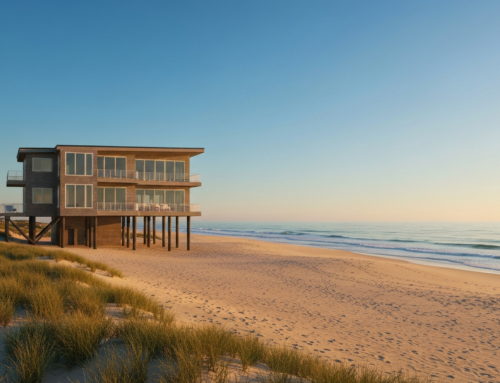Understanding the Unique Risks to Coastal Carolina Homes
Coastal Carolina is a beautiful place to call home, with its stunning beaches, vibrant communities, and rich history. However, living in this region also comes with unique risks, particularly when it comes to protecting your property. Understanding these risks is the first step in securing adequate Coastal Carolina home insurance solutions.
One of the primary concerns for homeowners in Coastal Carolina is the threat of hurricanes and tropical storms. These powerful weather events can bring strong winds, heavy rainfall, and storm surges that can cause significant damage to homes. Wind damage can range from missing shingles to complete roof failure, while flooding can inundate properties, leading to costly repairs and potential health hazards. For more insights on preparing for hurricane season, consider reading our guide on hurricane preparedness.
In addition to hurricanes, Coastal Carolina homes are also susceptible to other weather-related risks, such as severe thunderstorms, tornadoes, and coastal erosion. Thunderstorms can bring lightning strikes, which can cause fires and damage electrical systems. Tornadoes, while less frequent than hurricanes, can still pose a serious threat to property. Coastal erosion, driven by rising sea levels and strong wave action, can gradually undermine foundations and compromise the structural integrity of homes located near the shoreline.
Beyond weather-related risks, Coastal Carolina homes may also face challenges related to moisture and humidity. High humidity levels can promote mold growth, which can damage building materials and trigger allergic reactions. Saltwater intrusion can also corrode metal components and weaken concrete structures. Addressing these issues proactively through regular maintenance and proper building techniques is essential for protecting your investment.
Decoding Coastal Carolina Home Insurance Solutions: A Comprehensive Guide
Navigating the world of home insurance can be daunting, especially when you live in a high-risk area like Coastal Carolina. Understanding the different types of coverage available and how they apply to your specific situation is crucial for obtaining adequate Coastal Carolina home insurance solutions. This guide aims to demystify the process and provide you with the knowledge you need to make informed decisions.
A standard homeowners insurance policy typically covers damage from events such as fire, wind, hail, lightning, and vandalism. However, it’s important to note that most policies do not cover flood damage. Given the high risk of flooding in Coastal Carolina, it’s often necessary to purchase a separate flood insurance policy. You can learn more about assessing your flood risk by reviewing our guide on flood risk assessments.
When evaluating your home insurance needs, consider the replacement cost of your home. This is the amount it would cost to rebuild your home from scratch, using current materials and labor costs. Make sure your policy provides sufficient coverage to meet this amount, as you don’t want to be underinsured in the event of a major loss. Also, review your policy’s deductible, which is the amount you’ll pay out of pocket before your insurance coverage kicks in. A higher deductible can lower your premiums, but it also means you’ll have to pay more if you file a claim.
Liability coverage is another important aspect of homeowners insurance. This coverage protects you if someone is injured on your property and you are found liable. It can help cover medical expenses, legal fees, and other costs associated with the injury. Make sure your liability coverage is sufficient to protect your assets in the event of a lawsuit. You might also consider an umbrella insurance policy for extra liability protection.
Essential Coverage Types for Coastal Properties: Wind, Flood, and More
Homes in Coastal Carolina face specific perils that require tailored insurance coverage. Standard homeowners insurance often falls short in addressing these unique challenges, making it essential to understand and secure the right protection. When looking for Coastal Carolina home insurance solutions, wind and flood coverage are paramount.
Wind Coverage: Due to the frequency and intensity of hurricanes and tropical storms, wind damage is a major concern in Coastal Carolina. Some homeowners insurance policies may have separate windstorm deductibles, which are typically higher than standard deductibles. These deductibles can be a percentage of your home’s insured value, rather than a fixed dollar amount. Understanding your windstorm deductible is crucial, as it can significantly impact your out-of-pocket expenses after a storm. Review your policy carefully to determine the specific terms and conditions of your wind coverage.
Flood Coverage: As mentioned earlier, standard homeowners insurance does not cover flood damage. Flood insurance is available through the National Flood Insurance Program (NFIP) and from private insurers. The amount of coverage you need will depend on the value of your home and its location in relation to flood zones. Consider the potential for storm surge, which can cause widespread flooding even in areas not typically prone to flooding. It’s also worth noting that flood insurance policies typically have a waiting period, so it’s best to purchase coverage well in advance of hurricane season.
Additional Coverage Considerations: In addition to wind and flood coverage, you may also want to consider coverage for other perils specific to Coastal Carolina. This could include coverage for mold remediation, which can be costly, and coverage for damage caused by saltwater intrusion. Also, consider loss of use coverage, which can help cover living expenses if you have to temporarily relocate while your home is being repaired.
Protecting your home against fire is also crucial. Read this guide to ensure you’re prepared.
Factors Influencing Your Home Insurance Premiums in Coastal Carolina
Several factors can influence your home insurance premiums in Coastal Carolina. Understanding these factors can help you make informed decisions about your coverage and potentially lower your costs when searching for Coastal Carolina home insurance solutions.
Location: Your home’s location is one of the most significant factors affecting your premiums. Homes located closer to the coast or in designated flood zones will typically have higher premiums due to the increased risk of wind and flood damage. Elevation also plays a role, as homes built on higher ground are less susceptible to flooding.
Construction: The type of construction used to build your home can also impact your premiums. Homes built with hurricane-resistant features, such as impact-resistant windows, reinforced roofs, and elevated foundations, may qualify for discounts. Older homes may have higher premiums if they don’t meet current building codes.
Coverage Amounts: The amount of coverage you choose will directly affect your premiums. Higher coverage limits will result in higher premiums, while lower limits will result in lower premiums. It’s important to strike a balance between adequate coverage and affordability. Consider the replacement cost of your home and your liability exposure when determining your coverage needs.
Deductibles: As mentioned earlier, your deductible is the amount you’ll pay out of pocket before your insurance coverage kicks in. Higher deductibles can lower your premiums, but they also mean you’ll have to pay more if you file a claim. Choose a deductible that you can comfortably afford in the event of a loss.
Claims History: Your claims history can also affect your premiums. If you’ve filed multiple claims in the past, your insurer may view you as a higher risk and increase your premiums. Maintaining a clean claims history can help keep your premiums low.
Finding the Right Insurance Provider: Comparing Quotes and Policies
Finding the right insurance provider is a critical step in securing adequate Coastal Carolina home insurance solutions. Comparing quotes and policies from multiple insurers can help you find the best coverage at the most competitive price.
Shop Around: Don’t settle for the first quote you receive. Get quotes from at least three or four different insurers to compare coverage options and premiums. Online comparison tools can be a useful starting point, but it’s also important to speak with an insurance agent to discuss your specific needs.
Read the Fine Print: Before making a decision, carefully review the terms and conditions of each policy. Pay attention to exclusions, limitations, and deductibles. Make sure you understand what is and isn’t covered. If you have any questions, don’t hesitate to ask the insurance agent for clarification.
Check Ratings and Reviews: Research the financial stability and customer service reputation of each insurer. Check ratings from independent organizations such as A.M. Best and Standard & Poor’s. Read online reviews to get a sense of other customers’ experiences with the insurer.
Consider Bundling: Many insurers offer discounts for bundling multiple policies, such as homeowners and auto insurance. If you have both types of coverage, consider bundling them with the same insurer to save money. Speaking of auto insurance, be aware of what factors can affect your car insurance rates.
Work with an Independent Agent: An independent insurance agent can represent multiple insurers and help you find the best coverage for your needs. Independent agents can provide unbiased advice and advocate for you if you have a claim. They can also help you understand the complexities of home insurance and navigate the claims process.
Tips for Lowering Your Coastal Home Insurance Costs
While Coastal Carolina home insurance can be expensive, there are several steps you can take to lower your costs and still obtain adequate Coastal Carolina home insurance solutions.
Increase Your Deductible: As mentioned earlier, increasing your deductible can lower your premiums. However, make sure you can comfortably afford to pay the higher deductible in the event of a loss.
Install Hurricane-Resistant Features: Installing hurricane-resistant features, such as impact-resistant windows, reinforced roofs, and storm shutters, can qualify you for discounts on your homeowners insurance. These features can also protect your home from damage during a storm.
Improve Your Home’s Security: Installing security systems, smoke detectors, and water leak detectors can also qualify you for discounts. These measures can reduce the risk of theft, fire, and water damage.
Maintain Your Home: Regular maintenance can prevent costly damage and lower your insurance premiums. Keep your roof in good repair, trim trees and shrubs away from your home, and clean your gutters regularly. Be sure to follow these vital homeowner maintenance tips.
Shop Around Regularly: Don’t just shop around once. Home insurance rates can change over time, so it’s a good idea to compare quotes from multiple insurers every year or two to make sure you’re still getting the best deal.
Take Advantage of Discounts: Ask your insurance agent about available discounts. You may be eligible for discounts based on your age, occupation, or affiliation with certain organizations.
Protecting Your Investment: Maintaining Your Home for Insurance Purposes
Maintaining your home is not only essential for preserving its value but also for ensuring adequate insurance coverage. Neglecting maintenance can lead to denied claims or higher premiums, making it crucial to prioritize upkeep when seeking Coastal Carolina home insurance solutions.
Regular Inspections: Conduct regular inspections of your home’s roof, foundation, plumbing, and electrical systems. Look for signs of damage, such as leaks, cracks, or corrosion. Address any issues promptly to prevent them from escalating into more serious problems.
Roof Maintenance: Your roof is your home’s first line of defense against the elements. Keep it in good repair by replacing damaged shingles, cleaning gutters, and trimming trees that overhang the roof. A damaged roof can lead to water damage and other costly problems.
Plumbing Maintenance: Check your plumbing for leaks and drips. Repair any leaks promptly to prevent water damage and mold growth. Consider installing water leak detectors to alert you to potential problems.
Electrical Maintenance: Have your electrical system inspected regularly by a qualified electrician. Replace any worn or damaged wiring. Avoid overloading circuits, which can cause fires.
Landscaping: Keep your landscaping well-maintained. Trim trees and shrubs away from your home to prevent damage from wind and falling branches. Ensure that your yard is properly graded to prevent water from pooling around your foundation.
Documentation: Keep detailed records of all maintenance and repairs. This documentation can be helpful if you need to file an insurance claim. Take photos and videos of your home’s condition before and after any repairs.
By following these tips, you can protect your investment and ensure that you have adequate insurance coverage for your Coastal Carolina home. Always consult with a qualified insurance professional to discuss your specific needs and obtain personalized advice.
Remember to review your insurance policy annually to ensure it meets your current needs. You can learn more about insurance policy reviews here.
For more information on home safety, visit the Ready.gov website.
Have questions? Contact us here.






